
Junior Brett Cotler said he tries to keep up with current events by receiving news updates on his phone, including CNN tweets, and routinely checking several news sites.
According to David Mindich, professor of media studies, journalism and digital arts at Saint Michael’s College, many young people, specifically under the age of 40, lack a similar level of interest in the news as their knowledge of current events has substantially decreased.
Mindich, the author of “Tuned Out: Why Americans Under 40 Don’t Follow the News,” said that although many online news sources have become available in the 10 years since he wrote the book, young people exhibit a relatively low level of interest in current events.
This lack of knowledge leaves students vulnerable, according to Mindich.
“People who do not follow the news can be easily manipulated by slogans and vague ideas of what should be done,” Mindich said.
According to social studies teacher Sarah Ilie, paying attention to current events and becoming aware of the global community is increasingly important for young people.
“To be a successful participant in society, teens will need to maintain a global lens,” Ilie said.
Mindich’s book focused mainly on people who had graduated high school. Social studies teacher Robert Berg said that among high school students, he has not observed a decreased awareness of current events.
“I [haven’t noticed] a decline in interest. I have noticed a change in how kids look at [current events],” said Berg. “Kids are now using what I would not consider traditional media sources for information.”
Junior Madelaine Sorrisso said her interest in current events varies with the topic and with her ability to affect change.
“I know about politics, but I cannot vote yet, so it does not affect me,” said Sorrisso. “However, certain topics are of greater interest to me, so I pay closer attention. When it’s the presidential election, I care a lot more.”
According to Cotler, social media provides many connections to the news, but it can also distract people from reading it. He said that the time people previously used to spend reading the newspaper might now be spent interacting with friends on forms of social media, such as Facebook and Twitter.
Berg and Mindich both said current events should be a part of the curriculum.
“It is important for us, as teachers, to clear up misconceptions,” Berg said.
He added that he tries to incorporate current events into his social studies lessons.
According to Mindich, it is important to stimulate an interest in current events among high school students.
“If people don’t follow the news by their early twenties, studies have shown that they tend to not pick up the habit later,” Mindich said.
Mindich also suggested making political activity part of college admissions by adding a question to the Common Application, “What have you done to affect change in your community politically?”
Asking students to participate in political change encourages them to seek out news because, according to Mindich, students must be informed to change things.
“It is great that high school students are expected to volunteer for National Honor Society, but why not ask them to also be political?,” said Mindich. “That is not to say that we want students to be left-wing or right-wing, but to work towards changing something in the community.”
For students seeking to become better informed on current events, Berg said “the best news source is having a lot of news sources.” He recommends sources that follow journalistic standards, such as The New York Times or National Public Radio, although he concedes that many news organizations hire reporters who are not properly trained to adhere to standards of objectivity.
Ilie said students sometimes too willingly trust non-journalistic sources. She described a research project in her Comparative Global Issues class where students relied on blogs for information.
Ilie said those sources are biased. The quality of the information they provide is often not as reliable as information from professional news organizations.
For students who do have an interest in being informed, Cotler said that getting news through online updates is easy.
“If I see something important, I look at it,” Cotler said.

